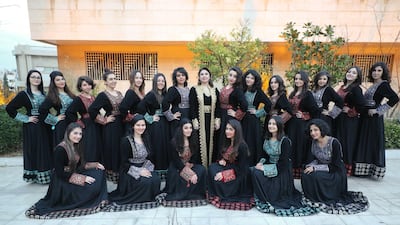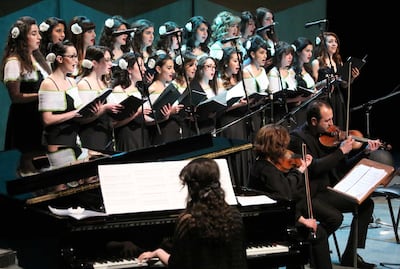While the soldiers fight, it is the civilians who pick through the pieces. For the women of Syria's Gardenia Choir, this is a harsh reality. Throughout the group's three-year existence, its members have had to frequently navigate the wreckage of the Syrian conflict to make it to their weekly practice.
Each of their concerts in Damascus, which are held in a variety of venues, from small courtyards to grand halls, is a victory of determination over logistics, peace over violence and, ultimately, hope over despair. In one of their first major international gigs, when they headline the UAE's annual Choirfest music festival at the Dubai Opera on Saturday, the Gardenia Choir will bring their repertoire of Arabic choral and folk pieces to the city.
"You really need to understand how important this is – we had a performance in Beirut last year, but this one will be our first international show," explains soprano Safana Baqleh, from Damascus. "We were invited for a show in Belgium as well, but they wouldn't give us the visas. This is why I thank the organisers in the UAE. It takes a lot of bravery to invite a group like us."
Resilience in times of war
That may be true, but it pales in comparison to the daily acts of courage that not only made the Gardenia Choir a trailblazing ensemble in Syria, but a global symbol of resilience. It is also quite apt that they are performing on the weekend of International Women's Day, on Friday, as they are the first professional all-female choir in Syria.
As Baqleh explains, the lack of women-led choirs is not down to a lack of material. "We came across, to our surprise, many works and repertoires that were meant to be for female choirs," she says. "But a lot of the choirs here mostly do Oriental music, and by that I mean they are men only or mixed. There was no culture of female choirs over here."
This is also down to the impact of war on the population. A less reported aspect of the Syrian conflict is how it decimated a once-thriving local music scene.
“So many bands fell apart,” Baqleh says. “We had many men who had to get out of the country or were in the army as part of their mandatory military service, and because of that they abandoned their music careers.”
It is that hole that Gardenia Choir aims to fill. In addition to providing some sense of artistic continuity amid the carnage of fighting, the ensemble is a place for women to meet and share their experiences. "At times of war, women manage their time better than men. Men are facing a lot of complexities," Baqleh says.
A message of peace
However, the group is not merely a hobby. Led by the indomitable leader Ghada Harb, a professor of classical singing at Damascus's Higher Institute of Music, rehearsals are rigorous affairs. In addition to passing on the principles learnt at the conservatory, Harb says her leadership style focuses on emotional intelligence. She views herself as the "big sister" of the group.
"Technically, I help them with their vocal techniques and vocal training," she says. "But there is a lot of work to be done psychologically as well. It is not merely about being a good performer. I want them to be more capable as women and to be more independent and powerful in how they express themselves. These are skills that affect all areas of their lives: socially and professionally and career-wise," she adds.
And it's working. With every show the choir performs in the Syrian capital, their acclaim grows and they have become a source of comfort to their audiences. "At first, we were viewed as a novelty because we were the first of our kind over there," Harb explains.
"But then they viewed our shows as a source of happiness, a chance to escape what was going on for one hour of good music. We have always been trying to send that message – one of peace and tolerance – and we choose the music that matches that."
That message was seared into the group's persona, Baqleh says, after a big supporter of the choir was killed in an attack last February.
"She died in a mortar that fell on the opera house," Baqleh explains. "We lost her merely like that and we were supposed to play in the opera house not many days after. We were traumatised and we were going to cancel. But we decided to continue.
“Because of how dangerous it was at that time we thought it would be a small audience, but the theatre was full. We dedicated the concert to her soul. We realised then that we have to keep going, no matter what happens, because that’s what makes us feel alive.
"If we quit, we are merely giving up and waiting for something to happen. We don’t want to be passive.”
Choirfest Gala Concert is at 3pm on Saturday at Dubai Opera. Tickets from Dh75, www.dubaiopera.com



